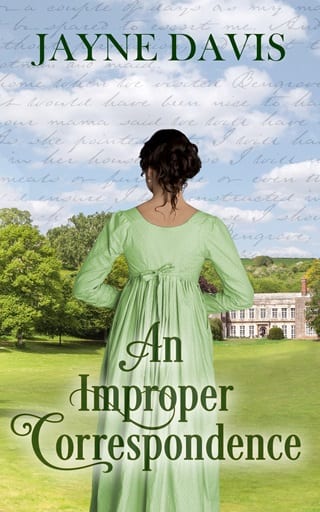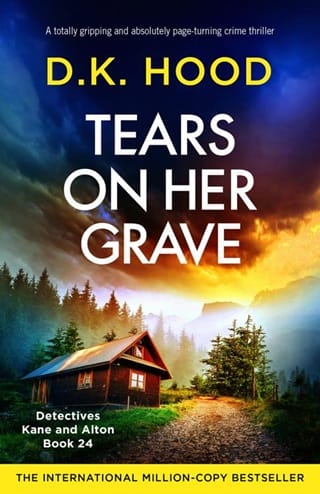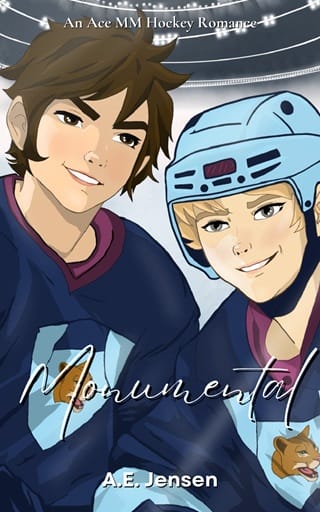Chapter 19
CHAPTER 19
A lfred came the following day as the hall clock was striking the hour. Jo, sitting in the library, heard the knock. She arrived in the hall, bonnet in hand, as Chivenor opened the door and Alfred stepped in bearing a bunch of roses.
"Joanna," he said, with his charming smile. "I hope I find you well today?"
"Yes, thank you, Alfred. And you?"
"All the better for seeing you, my dear." He held out the roses with another smile.
"Thank you, they are lovely." They must be hothouse blooms, to be available before June.
"Not nearly as lovely as your beautiful face, my dear."
Jo felt a blush rise, glancing at Chivenor, who was standing close enough to hear. He maintained his impassive expression, but Jo found it uncomfortable to be complimented in such a way in his hearing. In anyone else's hearing, really. "Thank you," she said again, handing the flowers to the butler. "Have them put in water, please."
She turned to the mirror to don her bonnet, its deep amber ribbons matching her new pelisse. Alfred held out his arm, and she took it for the few steps out to the waiting curricle. It was a smart vehicle, its body a glossy black and the wheels picked out in red and gold. Once she was settled in the seat, Alfred took the reins. The tiger jumped up behind as the curricle moved off.
It wasn't far to the park, and Alfred drove at a rather faster pace than Jo was used to with her father's coachman. She winced as they came close to knocking over a delivery boy.
"Don't worry, my dear," Alfred said. "You are perfectly safe. We're nearly at the park, too." They turned through the gates into one of the main drives, which was almost as crowded as Park Lane. Jo was relieved when Alfred slowed to the more sedate pace of the other people taking the air. Acquaintances hailed him—mostly military men by the look of them—but he waved or nodded without stopping.
"The horses are a handsome pair," Jo said, when Alfred didn't speak. There was less traffic further into the park, and he wouldn't need to concentrate on his driving here. "Are they yours?"
"My brother's. His curricle, too. A captain's income—" He frowned. "That is, he was happy enough to lend them to me until I can buy my own."
Did that mean he was planning to leave the army? But if so, why had he not just said so last evening when Papa asked him? She didn't feel she could question him about that, though—not yet. Nor the question of living apart from his mother. "Are you settling in properly now you are back in England?"
"Well enough," he said. "I can go where I wish to now, and there is more to do."
"How did you pass your time in Verdun? You didn't describe much in your letters."
"I'm not a great hand at letter-writing." He glanced at her, a brief frown changing to his charming smile. "Don't normally have the time."
"What did you find to do in Verdun?" Jo asked again. He must have had plenty of opportunity to write; he had even complained about not having enough to do.
"Oh, the usual." He kept his attention on the horses. "Same things that most gentlemen do. "
"They didn't keep you locked up, then?" Jo asked, knowing full well from Captain Delafield's letters that they had not. "So it wasn't really like being in prison?"
"Bad enough," he said abruptly. "Not allowed out of the town at night, having to sign a damned book every few days to show we hadn't escaped. As if the word of a gentleman were not good enough." He glanced at her again, giving her the full benefit of his most charming smile. "But that is over, now, and I am back with you. How did you spend your days while I was gone? Did you miss me?"
"I kept Mama company a lot of the time," Jo said. "She has not been well."
"I'm sorry to hear it. She seems recovered now, though."
"Yes, she is." She had mentioned Mama's illness several times in her letters, and this was the first time he had expressed any sympathy. "I read a lot," she added, when he didn't speak.
"Novels, eh?" he said genially.
"Mostly the Gazette and other newspapers." She had told Alfred about Papa's business interests when she first met him, but had not told him that she was involved. It was an occupation she would be reluctant to give up.
"Unusual! Oh, well, you won't need to bother your head with that in future. Women don't need to get involved in politics and the like."
That was not promising. "What will I do with my time?" Jo was beginning to feel irritated. "If we are to live with your parents, I won't even have the house to manage."
If they were to live at Bengrove Hall.
"Oh, women's things, I suppose. Embroidery and what not," Alfred said airily. "You'll enjoy the leisure, you'll see. And we will be in Town for the season, of course."
"We will go to the theatre together?" Jo asked. "And other events?"
"Mama will take you, I'm sure."
Jo grimaced—she'd rather scrub chamber pots.
Alfred must have noticed. "I'm sorry if Mama was… unpleasant last night." He spared a hand from the reins to pat her arm. "I'm sure she'll like you once you get to know her ways. "
Once she had adapted to Lady Bengrove's ways, no doubt.
"I cannot dance with your Mama at balls," Jo pointed out.
"Oh, no-one expects husbands and wives to dance with each other," Alfred laughed. "Don't you worry about that, my dear. We'll go on swimmingly, I'm sure."
What more could she say? It would not do to abuse his mother to his face, no matter what she thought of Lady Bengrove. She made an effort to smile, and looked about her for another topic of conversation. "I do enjoy being in the park; it makes a nice change from the noise of the city streets. Do you prefer Town or the country, Alfred?"
"They both have their attractions. Can't have a good gallop in Town, but there's not much fun to be had in the country apart from hunting and shooting."
"You enjoyed walking at Yelden."
He frowned momentarily, then turned his breathtaking smile on her. "I was with you , Joanna. Your presence makes any activity a delight." He drew the horses to a halt, and half-turned to face her. "I am sorry, my dear, if I seemed less than enthusiastic about escorting you about Town. I'm not very good at making polite conversation…"
Jo could sympathise with that—neither was she.
"…and having been confined for so long, I am unaccustomed to polite company. I'm sure escorting you will make such events enjoyable."
"We will enjoy more walks at Yelden," Jo said, comforted by his words and manner. "You will be joining us there in a few weeks' time."
"I look forward to it." He turned the horses towards the gate. "Do you mind if we return now? I have an appointment with my tailor shortly."
"No, of course not." She didn't say much as they drove back through the streets, and Alfred helped her down from the curricle.
"When can I see you again?" he asked, when Chivenor let them in.
"I would like to go to the exhibition at the Royal Academy." Jo handed her bonnet and pelisse to Chivenor. "Would you escort me?"
"Paintings." Alfred said, not looking terribly enthusiastic. " Interested in that kind of thing, are you? I'll call in a couple of days, and we'll see, eh?"
"Thank you, Alfred, that's very good of you," Jo said, as he bowed over her hand. "I'll see you tomorrow , then. Shall we say eleven o'clock? The crowd is likely to be thinner in the morning."
He frowned.
"The exhibition closes in a few days," Jo went on. "If I don't see it tomorrow, I probably won't be able to. I would like to go." He still hesitated. "Never mind, Alfred. It is short notice. I will see if my cousin George will escort me instead."
"Oh, in that case…" he said quickly, and a good deal more pleasantly. "I'll call for you, shall I?"
"Thank you, Alfred."
Today's drive had been considerably more enjoyable than last night's dinner, Jo reflected as Chivenor closed the door behind Alfred, although there had still been some uncomfortable moments. Perhaps that was to be expected; they had been apart for a long time. And she had not managed to ask him where they would live.
"A note arrived for you, Miss Stretton." Chivenor proffered the silver salver.
She broke the wafer and read the few lines. Catherine Bengrove had written, asking if she would be at home this afternoon. "Chivenor, please send to Mrs Bengrove that I will be at home if she wishes to call."
"I am sorry for such short notice," Catherine said, as they sat in the parlour an hour later. "I wanted to apologise for… for last night."
"What need have you to apologise?" Jo couldn't recall that Catherine had said anything to offend; she had not said much at all.
"For my mother-in-law. She was… less than polite at times. I understand she was feeling unwell."
"I see." That was no excuse; when Mama was unwell, it did not make her rude. And although Catherine had apologised, it would have been better had Lady Bengrove done so herself. "Well, it cannot be helped now."
"Did you enjoy your drive with Captain Bengrove?"
"Yes, thank you." Although it had also given her much to think about.
"Perhaps we can go together one day, and I can introduce you to some of my friends."
"Do you think they will wish to associate with me?" Jo recalled some of Lady Bengrove's words after dinner yesterday, and when Jo had visited Bengrove Hall with Papa. "Many families do not like the fact that Papa takes a hand in the enterprises in which he invests."
"I'm sure that won't cause a problem," Catherine said, a little too quickly. "Not everyone is as particular as Lady Bengrove." She leaned forward. "Does it surprise you to know that Bengrove and I live in the Dower House when we are in Staffordshire?"
Jo shook her head. "Oh. No, it doesn't surprise me." But it was disappointing news. "I had been wondering if Alfred and I might do so."
"I'm sorry." Catherine looked sincere, and Jo smiled. At least there would be one member of the family that she liked. One other member, she corrected herself hurriedly. "Don't be silly! Alfred and I will soon buy somewhere for ourselves, I'm sure."
"I… Yes, of course. Um, Bengrove—my husband, that is—was wondering how your Papa comes to know Lord Moorven."
"Through a mutual acquaintance, I think." That was the truth, even if only a part of it. "Why? Is it so odd that my father should know someone like him?"
"No, not at all. At least, I don't think so, of course." Catherine managed a bland face for this, but then they both laughed. "Shall we drive together the day after tomorrow? If the weather permits, of course."
"I'd like that, thank you. "
Jo was reading in the library the next morning when Chivenor knocked on the door and entered, holding a salver with a sealed note resting on it. "This was just delivered, Miss Stretton, together with flowers. I have sent them to be put in water."
Flowers? They must be from Alfred, but why did he not bring them himself, later? She picked up the note, recognising Alfred's scrawl, and broke the seal with a sinking feeling in her stomach. The note was short, apologising that he had been suddenly called out of town on urgent business and expected to be away for some days.
"Is everything all right, miss?" Chivenor asked.
"I… Yes, thank you, Chivenor. Please tell Martha we will not be going out this morning."
"Very good, miss."
Jo sighed as Chivenor left. Before Mama lost the last baby, she had enjoyed going to the annual exhibition with Jo, and often bought one or two paintings. Last year, Jo had been too worried about Mama's health to attend, but she did want to this year. Her disappointment mingled with irritation as she recalled Alfred's words before they parted yesterday. He hadn't been enthusiastic about accompanying her—had he intended to cry off even then?
No, surely not. She had no reason to doubt the explanation he had sent.
Could she go with only Martha for propriety? Possibly, but part of the enjoyment of viewing the exhibition was discussing the art with someone else. She dismissed yesterday's idea of asking George to take her if Alfred could not; even if George were free at such short notice, he didn't care for ‘gawping at daubs', as he put it, and she would not enjoy herself knowing that he was bored.
The exhibition still had a couple of days to run. Perhaps Catherine would accompany her tomorrow instead of driving in the park? She would write and ask—Catherine might also know what had taken Alfred off so suddenly.
Papa entered her parlour as she was finishing the note. "Chivenor tells me you are not going to the exhibition—has something happened? "
"Alfred was called away on urgent business."
"That's a shame." He glanced at the clock on the mantelpiece. "Shall I accompany you? I have a little time… No. Give me half an hour to finish some business, then we can spend several hours there. Does that suit you?"
"Oh, yes, Papa. Thank you!" Papa would be a better companion than Alfred, given his initial lack of enthusiasm for the outing.
"I think your mama is not yet well enough for such an event," Papa went on, "but perhaps we could choose a painting for her."
They walked there together, enjoying the warm weather and hazy sunshine. Papa paid for a catalogue, and they toured the exhibition rooms discussing the merits, or otherwise, of the paintings on display. Papa put his name against one of the remaining unsold landscapes—a restful scene of bucolic life. But the image that fascinated Jo depicted the storming of a citadel in Spain. Consulting the catalogue, Jo found it was San Sebastian; Wellington's forces had captured it the previous year. Seeing the masses of troops amongst the smoke, and the walls and steep ground they had to scale, was vastly different from reading dispatches in the Gazette . She returned to it before they left the exhibition.
"It is already sold, Jo," Papa said as they peered up at it.
Jo shook her head. "I don't think I'd want it hanging on the wall even if it were available. I cannot imagine what it must have been like to be there. Alfred would not have been involved in something like that, would he?"
"The cavalry would not, no. But Captain Delafield might have taken part in similar actions before he was captured." He laid a hand on her shoulder. "The war is over now, though."
Jo nodded, and took Papa's arm as they left Somerset House. "How do you like Captain Bengrove now he is here with us?" he asked as they walked home.
Jo thought for a moment before answering. "Sometimes I like him very well—very well indeed." That smile! "But I still hardly know him, and I wonder how we will live together. He thinks I will not want to read the papers, and will do ‘women's things'. "
Papa chuckled. "Things your mama enjoys, like embroidery?"
Jo shrugged. "He mentioned that, yes. It passes the time, I suppose."
"Many men—and women—think the same, Jo. You may find it difficult to find a husband who does not need to be persuaded that you're genuinely interested in such things, not merely helping me."
Perhaps she could persuade Alfred, but she wished she did not need to.
"He's had a frustrating, and probably tedious, time being shut up in Verdun," Papa went on. "It will be a big change for him now he's back, and he probably had some urgent business to see to that kept him away from you today."
"Do you approve of him, Papa?"
"Not necessarily, I want you to have time to make up your own mind about him. You liked him well enough to promise to wait for him two years ago, and I need to know him better before giving my permission. We can do that at Yelden." He patted her hand where it rested on his arm. "I will do my best to persuade you against it if I think you will not suit. And if you do decide against it, your mama will accept it more readily if you have spent more time together. However, you are of age, and I will not cause a rift between us by forbidding you if we disagree. After all, he may not be as obnoxious as his parents."
"Being worse than Lady Bengrove could be quite difficult, I think."
Papa chuckled. "Indeed."
 Fullepub
Fullepub 



